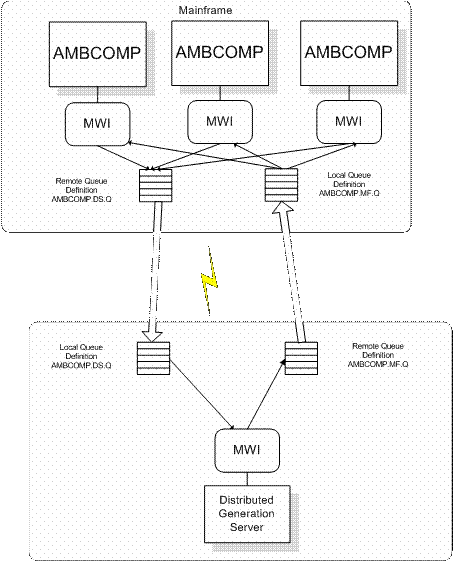The WebSphere MQ DGS Interface
This section provides an overview of WebSphere MQ technology, and how it interfaces with Distributed Generation Server. The definitions presented assume that WebSphere MQ distributed queuing is used and it is assumed that the proper sender and receiver channel pair definitions exist between each Distributed Generation Server machine and the mainframe:

Each Mainframe to DGS connection has a pair of local and remote queue definitions. Figure 1 is an example of this. On the mainframe, there is a remote queue definition, AMBCOMP.DS.Q, that refers to a local queue definition on the Distributed Generation Server. The local queue should be defined SHARE DEFSOPT(SHARED). On the Distributed Generation Server machine, there is a remote queue definition, AMBCOMP.MF.Q, that refers to a local queue definition on the mainframe. This local queue should also be defined SHARE DEFSOPT(SHARED).
The layer that interfaces with WebSphere MQ is called the Middleware Interface (MWI). The MWI puts messages into the queue and gets messages from the queue. Messages are sent from AMBCOMP to the Distributed Generation Server via the MWI.
The Distributed Generation Server MWI waits to receive a message. In this example, it monitors AMBCOMP.DS.Q. When a message is received, it processes the generation request. When the generation request is complete, a message is placed into the reply queue (AMBCOMP.MF.Q) and then the Distributed Generation Server gets the next message from the queue. If there are no messages available, the Distributed Generation Server waits.
On the mainframe, messages are retrieved from AMBCOMP.MF.Q by correlation ID, thus ensuring that response messages are delivered to the AMBCOMP process that initiated the generation request.
For information on specifying WebSphere MQ objects to the Distributed Generation Server Mainframe and PC environments, see Installing WebSphere MQ.